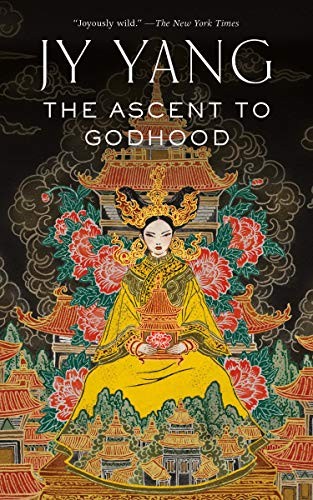enne📚 reviewed The Ascent to Godhood by Neon Yang (Tensorate, #4)
The Ascent to Godhood
3 stars
This is the final novella in the Tensorate series. The narrative setup here is that Lady Han (leader of the Machinists) is in a bar mourning; the book itself is her retelling the story of her past relationship with Hecate the now-dead Protector to (an implied an off page) pirate queen Kayan as the audience (along with the reader). This is not really a spoiler as it happens in the opening paragraph.
(Aside: this may be the only book I've ever known that has a pirate queen in multiple books who manages to remain entirely off page!!)
It's an interesting choice to me to have the final book focus on Akeha and Mokoya's mother Hecate, the hated antagonist from book one and the head of the Protectorate. It's also quite a choice to start the book off with Hecate dead and to talk entirely about the past rather than about how that came about. That said, I found myself intrigued by the story of how Hecate came to power and how Lady Han and Hecate ended up falling out, but I was surprised by how few details there were about the fall of Hecate overall. In terms of the plot, there's good reason why there are such scant details, but as a reader I was a little unsatisfied to have this action happen off page.
I appreciate the extra texture and details it gives to Hecate and to the Protectorate as a whole. I don't know that I'd say that this humanizes Hecate very much, as the book does not make excuses about empire; if anything, even if Lady Han believes that things were better under Hecate's rule than they were in the past, she also makes no excuses for the horrible things that Hecate (and she) did to preserve that rule.
Because this novella is such a snapshot of Lady Han's own story, I found myself hungering for details about Lady Han's sister, or more details around the events of Hecate's death, or even more details about where the future was going from here (especially re: Rider and Tua but also the larger world). This may just be more "I want more in a novella than it has room for" feelings. That said, I think this novella's focus is much more on emotional themes of trust and relationships across power differentials that additional perspectives would have detracted from that emotional thrust.
(One final gender thought from this series is that there's an implication that the "delayed puberty" and confirmation practices from the first book are maybe a localized or privileged position: "You have to understand, out in those areas, we didn’t do gender like they did in the capital. You get born as one thing, you’re expected to stick to it." I think the gender worldbuilding and plot details of this series got less important into the later books, but I still appreciated the small details that added a lot of color to how the world worked.)
Overall, the whole series feels like a snapshot of a revolutionary time period in an empire told through the perspectives of characters on the periphery of power, and also told in a surprising variety of narrative styles. It's two children of Hecate, it's an investigator looking into the empire's misdeeds, and finally it's the lover who turned against that empire. All of these perspectives in part are in the shadow of Hecate the protector and her fight against the Machinists and to consolidate power. The larger arc plot around prophecy is slowly revealed in bits each book and ties into the conclusion of each.
I enjoyed this series a good bit. The strength for me is that each novella is a standalone great emotional arc for a single protagonist, while fitting in worldbuilding and character details in the wake of this arc. However, because of this, even as I enjoyed each book individually, the series taken as a whole feels a little disjointed and less cohesive than I wanted.

